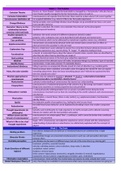Samenvatting
Brief Summary for All Required Topics for the Consciousness Exam
- Instelling
- Universiteit Leiden (UL)
This document contains a table with keywords/topics sorted and color-coded by week. The keywords/topics are the ones posted by the course coordinators as required material for the exam. There are brief explanations for each keyword/topic for quick and efficient studying. It gives a great overall vi...
[Meer zien]




